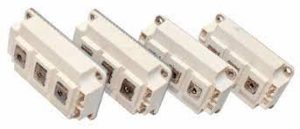How Does an IGBT Agent Differ
IGBTs are the heart of power modules that distribute and convert DC current from electric vehicle batteries to AC current used in EV/HEV motors to drive the propulsion system. As such, the power module is a key component in improving energy efficiency and battery range for the electric vehicle drive train.
A power module is a composite package that consists of several IGBT and free-wheeling diode (FWD) chips packaged together. It enables electrical conduction paths between the IGBT and FWD chips and provides thermal pathways for heat generated to be transferred to a heat sink. It also contains signal processing, amplification, protection circuits, parasitic diodes, and other control components. The power module is a crucial building block in the design of power electronic systems such as DC-DC converters, industrial power supplies, renewable energy sources and electric vehicles.

High power density and fast switching speeds are critical for efficient operation of IGBT agent. However, such high performance comes at a price. Elevated operating temperatures impose significant thermal stresses on IGBT modules. This causes a variety of long-term failure modes such as bond wire fatigue, latch up, and secondary breakdown [23].
How Does an IGBT Agent Differ From a Standard IGBT Module?
A significant portion of field failures is associated with extensive electro-thermal stress caused by temperature cycling [1],[23]. The high peak-to-peak temperature fluctuation at the junction of IGBTs degrades the mechanical structure of the IGBT modules. It is manifested as a variety of failures such as bond wire lift-off and rupture, heel cracks in the base plate, pad cracks, Heisenberg effect due to strain fatigue of Heisenberg layer, and localized melting near bond wire pads as shown in Fig. 9.
In accelerated lifetime testing (ALT), IGBTs are continuously switched on and off in order to produce repetitive heating and cooling cycles to measure degradation precursors and maximum junction temperature. However, estimating the maximum junction temperature is often complicated by variations in test variables, such as a large difference between the CTE of IGBTs and their package metallization, a small difference in insertion depth between the gate terminal and the center of the chip, and variation in temperature of different areas on the same IC.
To overcome these challenges, the Danfoss IGBT agent consists of an intelligent software that analyzes the underlying thermo-mechanical and thermal properties of IGBT modules and provides an accurate, physics-based model of their behavior. The model can predict the long-term performance of IGBT modules and helps evaluating their suitability for specific applications. It can also recommend design changes to improve the performance of the IGBT module. For example, it can help to reduce the power loss of the IGBT by optimizing the paralleling of IGBT and FWD cells in a chopper, half-bridge or six-pack configuration. In addition, it can identify the best cooling strategy to minimize the impact of thermal stress. This way, the IGBT agent can ensure that the power module can deliver reliable performance over its lifetime. This enables customers to meet the reliability and cost targets for their specific application.
Jinftry (JING FU CAI (HONGKONG) INTERNATIONAL CO., LIMITED) is a global professional one-stop procurement and service provider of electronic components. It uses independent distribution, platform distribution combined with the Internet online sales model to sell various products worldwide. Types of electronic components, providing one-stop component procurement and supply chain services to global OEM factory customers and brokers. Sales include integrated circuits, discrete semiconductors, IGBT modules, connectors, capacitors, diodes, transistors and other electronic components, covering power supply, automotive, communications, computers, consumer products, medical, industrial, mobile phone and other application fields.
Jinftry product line cards: TI, ONSEMI, Microchip, Maxim, NXP, STM, Xilinx, Intel, Infineon, Broadcom, Renesas, samtec, Souriau, CISSOID, Mitsubishi, FUJI, Semikron, etc.

Website: https://www.jinftry.com
Shenzhen Operation Center Address: 26F1, Building C, Electronic Technology Building, Shennan Middle Road, Futian District, Shenzhen, Guangdong, China
Hong Kong company name: JING FU CAI (HONGKONG) INTERNATIONAL CO., LIMITED
Registered address of Hong Kong company: Unit No.A222,3F,Hang Fung Industrial Building,Phase2,No.2G Hok Yuen Street,Hunghom,Kowloon,Hong Kong
Email: [email protected]
Tel: +86-755-82518276